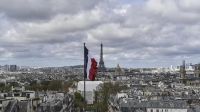HAVANA — President Obama’s opening to Cuba has accelerated a surge in Cuban migration to the United States, the latest U.S. statistics show, as many on the island grow worried that America’s long-standing immigration benefits for Cubans are now in jeopardy.
Last month the Coast Guard intercepted 481 Cubans in rickety boats and rafts, a 117 percent increase from December 2013. But the boaters account for only a fraction of those attempting to reach the United States. At the Miami airport and ports of entry along the Mexican border, the number of Cubans who arrived seeking refuge jumped to 8,624 during the last three months of 2014, a 65 percent increase from the previous year.
Many Cubans have heard warnings for years that their unique immigration privileges — which essentially treat anyone from the island who sets foot on U.S. terra firma as a political refugee — would not last forever.
And they have seen Cuban American lawmakers such as Sen. Marco Rubio (R-Fla.) increasingly object that too many recent arrivals make a mockery of their refugee perks by going back to the island for cheap dental work or Santeria ceremonies.
U.S. officials have repeatedly given assurances that these migration laws have not changed. But the surprise nature of Obama’s Cuba move — after 18 months of secret talks with officials of the Castro government — has reinforced the sense that any of the long-standing pillars of U.S. policy toward the island could fall without warning.
Cubans hoping to obtain visas to travel to the United States stand in line outside the U.S. Interests Section in Havana. (Sarah L. Voisin/The Washington Post)
“Anyone who is thinking about making the leap should do it as soon as possible,” said “Pupi,” one of the Web users offering advice on busy chat forums such as Cubans in Flight and Cuba in Miami where migrants trade tips and share the stories of their journeys.
U.S. Customs and Border Protection could not provide an up-to-date monthly breakdown of Cuban arrivals. But at U.S. border crossings with Mexico, 6,489 Cuban migrants arrived during the last three months of 2014, up from 4,328 the year before. The number of Cubans processed through the agency’s Miami field office rose from 893 to 2,135 over that same period.
Many of those Cubans flew straight into the Miami airport, having boarded flights in Madrid; Nassau, Bahamas; or elsewhere with passports from Spain and other third countries. Upon reaching U.S. Customs, they pull out their Cuban documents and request asylum, or ask to stay under the protections offered by the 1966 Cuban Adjustment Act, which offers permanent residency to Cubans one year after arrival in the United States.
When U.S. diplomats traveled to the island last week for talks on migration with their Havana counterparts, they were emphatic that the benefits conferred on Cuban migrants were not up for debate.
“We explained to the Cuban government that our government is completely committed to upholding the Cuban Adjustment Act,” said Alex Lee, the State Department official leading the migration-related elements of the talks, which also paved the way for each country to reopen an embassy in the other’s capital.
Cuban officials at the talks repeated their adamant opposition to the Cuban Adjustment Act and the “wet-foot, dry-foot” policy under which Cubans are eligible to stay in the United States if they touch U.S. soil. Those intercepted at sea are returned to Cuba.
Havana blames that policy for encouraging risky illegal migration and fueling a brain drain of the country’s professionals, who are enticed to take their training and talent to the United States after receiving a free education through the island’s socialist system.
Former Cuban leader Fidel Castro ended his long silence over his country's decision to restore diplomatic ties with the United States, writing that he backs the negotiations even though he distrusts U.S. politics.
But even as the Cuban government denounces the policy, it has quietly adjusted its laws to reflect the sweeping changes that have occurred in migration patterns over the past half-century, during which more than 1 million Cubans have resettled in the United States.
In ever-growing numbers — an estimated 400,000 trips last year — these Cuban Americans are traveling back to the island.
Reaching the U.S.
The Cubans who fled Fidel Castro’s communist system in the 1960s lost their property and essentially couldn’t return. The Adjustment Act assured them of a new life in the United States.
“It was a gift from LBJ to the Cuban people,” said Miami immigration lawyer Wilfredo Allen, who said he has been receiving calls and e-mails from nervous Cubans living in Europe and Latin America wondering if they need to hurry to reach the United States and secure residency status before a window closes.
A new generation of Cuban migrants increasingly resembles economic migrants from other Latin American countries. Some go abroad to work seasonally, then return home to live cheaply off their savings. Raúl Castro’s government has facilitated that by lifting most restrictions on travel and approving other measures to let Cubans come and go without losing their property or access to benefits such as free health care.
The U.S. Interests Section in Havana provides roughly 20,000 immigration visas to Cubans each year as part of the existing migration agreements between the two countries. Applicants line up each morning in a park a block away from the massive building that houses the Interests Section, which issued an additional 40,000 non-immigrant visas last year.
“Everyone is waiting to see what the result will be of this normalization with the United States,” said Aliosis Gongora, owner of one of the many businesses around the Interests Section that charge fees to help fill out visa applications.
An additional 15,000 to 25,000 Cubans enter the United States each year at U.S. border crossings, airports and South Florida beaches. The image of the tattered Cuban rafter remains powerful, but many of the Cubans who arrive today are not the island’s poorest and most desperate.
They are among the hundreds of thousands of Cubans who have obtained legal residency or travel documents in a third country, some by marriage, others by moving to nations such as Ecuador, Panama or Venezuela.
At least 65,000 Cubans have received Spanish passports under a law that bestowed citizenship on the children or grandchildren of emigres, and an additional 110,000 are eligible to get them. Like citizens of other European nations, they don’t need U.S. visas, so those Cubans can essentially board a flight anywhere, then petition for asylum when they arrive at U.S. airports and identify themselves as Cuban.
The travel habits of newer arrivals are at the heart of the Cuba debate in Washington. Advocates of Obama’s thaw say these Cubans will act as agents of change by supporting Cuban entrepreneurs and spreading democratic values. Critics say they are pouring money into Castro government coffers and abusing their privileges as political refugees. Local legislators in Miami-Dade County last week urged Congress to revise the Adjustment Act.
“I’ve never criticized anyone who wants to go back to Cuba to visit a loved one,” Rubio said last year. “What I do think is that if you come to this country and say you are in exile, fleeing oppression . . . and you travel back to Cuba 20, 30, 40 times a year, it really undermines that argument.
“That sort of travel puts at risk the status Cubans have,” he said, adding that he supports a “re-examination” of the Adjustment Act, without giving specifics.
Phil Peters, president of the Cuba Research Center in Alexandria, Va., and a former State Department official under presidents Ronald Reagan and George H.W. Bush, argues that the Adjustment Act is overdue for an update, possibly requiring Cubans to demonstrate political persecution, as migrants from other countries must do.
“There is no reason for Cubans to be the chosen people of U.S. immigration policy, with automatic admission, residency and financial benefits, regardless of need or circumstance,” he said.
The law has also functioned for decades as a political pressure valve, he added.
“The grand irony is that the open-door immigration policy does more to weaken the development of political opposition in Cuba than any other factor, draining the country of tens of thousands each year who are looking for other options,” he said.
The New York Times









